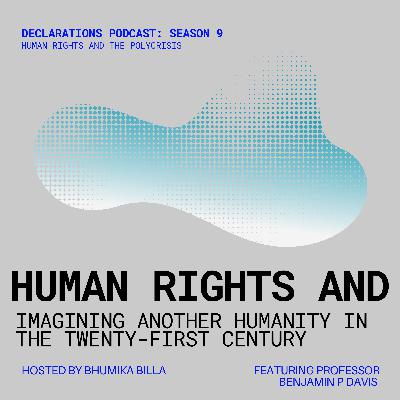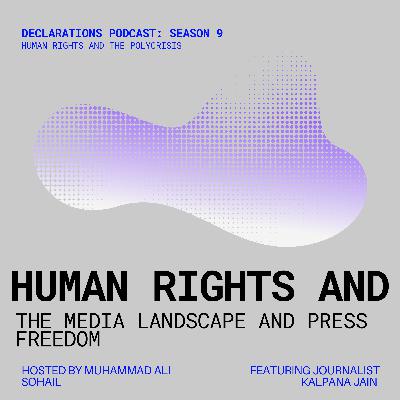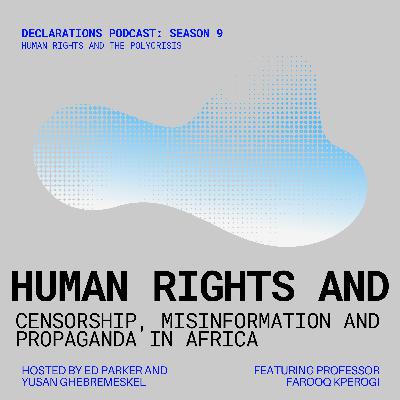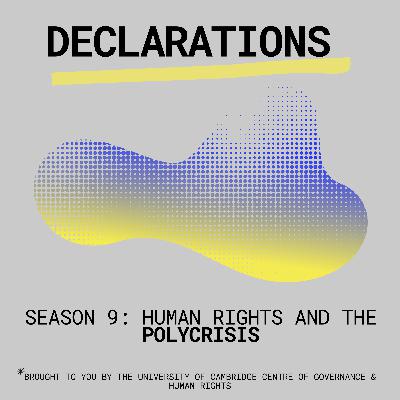Discover Declarations: The Human Rights Podcast
Declarations: The Human Rights Podcast

Declarations: The Human Rights Podcast
Author: Declarations: The Human Rights Podcast
Subscribed: 473Played: 6,514Subscribe
Share
© Declarations: The Human Rights Podcast
Description
A show about human rights coming to you every week from the Cambridge Centre of Governance and Human Rights.
Tune in each week as we explore how the concept and practice of human rights can remain fit-for-purpose and co-evolve with the changing world order, joined by fascinating guests from the University of Cambridge and around the world.
Tune in each week as we explore how the concept and practice of human rights can remain fit-for-purpose and co-evolve with the changing world order, joined by fascinating guests from the University of Cambridge and around the world.
110 Episodes
Reverse
In this episode, we explore the European Court of Human Rights (ECHR) — often hailed as the “conscience of Europe” and one of the most successful human rights institutions in the world. But in an era of democratic backsliding, populist politics, and eroding faith in institutions, what does “justice” look like today?Drawing on eight years of fieldwork with advocates, lawyers, and judges at the ECHR, Professor Jessica Greenberg’s Justice in the Balance examines how the Court functions both as a bureaucratic machine and as a moral ideal. Through her ethnographic lens, she reveals the tensions between law’s promise and its practice — between the aspiration of human rights and the limits of the institutions meant to protect them.This conversation probes the contradictions at the heart of the European project: Can legal institutions still serve as engines of democracy and hope, or have they become hollow symbols of a fading order?About the Guest: Jessica Greenberg is a professor of Anthropology at the University of Illinois, Urbana-Champaign. Prior to coming to UIUC, Greenberg was an Academy Scholar at the Harvard Academy for International and Area Studies, and an Assistant Professor in Communication Studies at Northwestern University. She recently earned a Master of Studies in Law at the College of Law, University of Illinois. She is also currently the Co-Editor of the Political and Legal Anthropology Review (PoLAR).Website: https://anthro.illinois.edu/directory/profile/jrgreenbEmail: jrgreenb@illinois.eduConnect with Us:Subscribe below for more regular and profound discussions. Connecting practitioners, activists, and students together to dissect the compelling intersections related to human rights and social justice. Subscribe on :Spotify: https://open.spotify.com/show/33zeclUn2wMUIxRjsOApPW Apple Podcasts: https://podcasts.apple.com/gb/podcast/declarations-the-human-rights-podcast/id1178474117 Follow us on X: @DeclarationsPod Instagram: @declarationspodcast LinkedIn: Declarations: The Human Rights Podcast Share your thoughts using #declarationspodcast Email us at info@declarationspod.com Episode Credits Host: Ed Parker Producer: Ed Parker and Sarah Awan Executive Producer: Sarah Awan Show Notes: Yusan Ghebremeskel Publisher and Communications Manager: Evie Nicholson Editor: Max Parnell
What does it mean to imagine another humanity in a century marked by war, displacement, and deep inequality? In this episode, we sit down with Benjamin P. Davis, author of Another Humanity: Decolonial Ethics from Du Bois to Arendt. Davis traces shifting ideas of “the human” through the works of W. E. B. Du Bois, Édouard Glissant, Sylvia Wynter, and Edward Said—thinkers who redefined human rights and humanism in the face of empire and exclusion. Drawing on Hannah Arendt’s post-war correspondence with Karl Jaspers, Davis invites us to reflect on what a decolonial ethics of humanity might look like today. Together, we ask: how might we live into Glissant’s question of whether we have the right, and the means, to imagine another dimension of humanity?About the Guest Benjamin Davis is a scholar of political theory, decolonial ethics, and the global histories of human rights. He previously held fellowships with the Department of African American Studies at Saint Louis University and the Centre for Ethics at the University of Toronto.He is the author of three books. His first, Simone Weil’s Political Philosophy: Field Notes from the Margins, repositions the mystic Simone Weil as a major political thinker. His second book, Choose Your Bearing: Édouard Glissant, Human Rights and Decolonial Ethics, interprets poet and theorist Édouard Glissant as a vital voice for contemporary human rights practice. His most recent book, Another Humanity: Decolonial Ethics from Du Bois to Arendt, offers a defense of “the human” and “humanity” amid today’s critical theoretical debates.Website: https://benjaminpdavis.com/Email: benjamin.davis [at] tamu.edu. Connect with Us Subscribe below for more regular and profound discussions. Connecting practitioners, activists, and students together to dissect the compelling intersections related to human rights and social justice. X: @DeclarationsPod Instagram: @declarationspodcast LinkedIn: Declarations: The Human Rights Podcast Share your thoughts using #declarationspodcast Email us at info@declarationspod.com Episode CreditsHost: Bhumika Billa, Guest HostProducer: Bhumika Billa and Shubham JainExecutive Producer: Sarah Awan Podcast Lead: Shubham JainShow Notes: Yusan Ghebremeskel Publisher and Communications Manager: Evie Nicholson Editor: Max Parnell
Welcome back to Declarations!In this episode, we’re joined by renowned journalist Kalpana Jain to explore how the media landscape has evolved and how press freedom is shifting across the globe. From the West to South Asia, we unpack the complex forces shaping what gets reported, whose voices are amplified, and how journalism is being redefined today. The media has undergone a seismic shift over the past two decades, technologically, politically, and economically. Today, journalism faces mounting constraints: declining independence, a shrinking space for investigative work, all amid escalating risks for journalists worldwide. At the same time, newsrooms are evolving rapidly to combat the rise of misinformation in an increasingly complex digital environment. About the guest:Kalpana Jain is a senior journalist and currently senior ethics and religion editor at The Conversation US, a global news and commentary-based website.She has covered a wide range of issues both in the U.S. and internationally. She was senior education editor at The Conversation US, before moving into her current role. She worked as a writer and researcher at Harvard Kennedy School and Harvard Business School She was part of a small, select team for a flagship program of Harvard Business School researching 50 years of women at HBS.She worked for many years as a reporter and editor at India’s leading national daily, The Times of India. Her reporting played a significant role in elevating public health as an important topic of news coverage. Based on her reporting, she was selected a Nieman Fellow in Global Health Reporting in 2009. She has taught case-writing at Harvard. She has conducted workshops teaching scholars at Harvard Divinity School, Stanford University, on how to write for the general public. She has also conducted such a workshop for religion scholars at the annual conference of American Academy of Religion.She is an alumna of Harvard Divinity School and Harvard Kennedy School. She holds a Master’s in Theological Studies and a Master’s in Public Administration. In 2010, she was awarded William A. Starr fellowship for innovative thinking in journalism and John Kenneth Galbraith Fellowship for outstanding academic and professional achievements at Harvard.Subscribe below for more regular and profound discussions. Connecting practitioners, activists, and students together to dissect the compelling intersections related to human rights and social justice. Share your thoughts using #declarationspodcast Email us at info@declarationspod.com Episode Credits Host: Muhammad Ali Sohail Producer: Muhammad Ali Sohail and Sarah Awan Executive Producer: Sarah AwanPodcast Lead: Shubham Jain Show Notes: Yusan Ghebremeskel Publisher and Communications Manager: Evie Nicholson Editor: Max Parnell
Welcome back to the second episode of Season 9 of Declarations!We are often informed to the terrorising, oppressive and distressing effects of Human Rights abuses across the continent of Africa. However, what happens in the rare cases that citizens don't know they're being abused? By exploring the implicitly powerful weapon of censorship, misinformation and mass propaganda, we can observe how patriotic, anti-western narratives succeed in instilling hope and nationalistic pride, rather than terror, to these inhabitants. Farooq Adamu Kperogi is a Nigerian-American professor, author, media scholar, newspaper columnist, blogger and activist. Professor Kperogi's research broadly explores the intersection between communication in a global context and the singularities of the communicative practices of marginal groups within it. He is interested in the transnational, mass-mediated, online discourses of marginalised diasporas in the West, which he studies by examining the alternative and citizen online journalistic practices of previously disempowered Third World ethnoscapes whose voluntary geographic displacement to the Western core imbues them with the cultural and social capital to be vanguards for potentially transformative cross-border exchanges with their homelands. Subscribe below for more regular and profound discussions, connecting practitioners, activists, and students together to dissect the compelling intersections related to human rights and social justice. Share your thoughts using #declarationspodcast Email us at info@declarationspod.com Episode Credits Host: Ed Parker & Yusan Ghebremeskel Producer: Yusan Ghebremeskel Executive Producer: Sarah Awan Show Notes: Yusan Ghebremeskel Publisher and Communications Manager: Evie Nicholson Editor: Max Parnell
Welcome back to Season 9 of Declarations!This season we are looking at the notion of Human Rights and The Polycrisis.In our first episode, Co-host Ed Parker sits down with Andrew Preston, an acclaimed historianof American foreign relations post 1890, to trace the role of human rights in American protest movements and foreign policy debates, asking whether humanitarian ideals have ever truly guided U.S. decision-making. From campus protests against the Vietnam War to campaigns like Save Darfur, American activists have long invoked the language of human rights topress for change at home and abroad. But has this discourse meaningfully shaped U.S. foreign policy—or has it always taken a backseat to strategic interests?Together, they explore key moments when human rights language surged, examine its retreat in recent years, and consider how American power has influenced—and at times undermined—thebroader global human rights regime. Looking ahead, they ask whether we are witnessing a lasting shift in U.S. foreign policy priorities or simply thelatest chapter in a long cycle of competing values and interests.We hope you enjoyed this podcast. If you did, please check out our last season, available on all podcast platforms, or follow us on social media @DeclarationsPodShare your thoughts using #declarationspodcast Email us at info@declarationspod.com Credits:Host: Ed Parker Producer: Ed Parker and Sarah AwanExecutive Producer: Sarah AwanShow Notes: Yusan GhebremeskelPublisher and Comms Manager: Evie NicholsonEditor: Max Parnell
Join our host, Iman, in conversation with Lucy Amis from the University of Cambridge's Centre for Sport & Human Rights (CSHR), alongside our panellist and podcast lead Shubham Jain, as they discuss the need for mainstreaming human rights in sports, and how the CSHR's innovative initiative, the 'Human Rights Volunteer Programme', can help promote human rights during sports events and offer a means for remedy for violations.
Join guest host, Dounia, in conversation with Omar Alshogre as they discuss the relationship between activism and human rights in the context of the Syrian revolution. What is the future of the Syrian revolution? Has it fallen into oblivion? Will Syrians ever succeed in getting rid of a regime which has been plaguing the country for more than 50 years?
Join our guest host, Maryam, in conversation with special guest Salman Sufi, founder of the Salman Sufi Foundation, as they discuss gender-based violence in Pakistan. How can the systemic infrastructure perpetuate such violence, and what can human rights activists do to mitigate these harms and close some of these systemic gaps?
Join our host, Iman, in conversation with special guests, Uma Chakravarti and Suchitra Vijayan, and our panellist Jigisha Bhattacharya, as they discuss incarceration and its politics in contemporary India, focusing on addressing concerns such as human rights violations, democratic oversight and the silencing of dissident voices.
In this episode of Declarations, our host Iman is joined by special guest Siri Gloppen and panellist Charlotte Abercrombie to discuss global democratic backsliding and its impact on human rights. They evaluate the role of courts in safeguarding human rights and the risks of politicising fundamental freedoms. This episode comes at a crucial period, where democracies appear to be in peril worldwide.
In this episode, our host Iman is joined by special guest Tarah Demant and panellist Tess Hargarten to discuss the impact of Western hegemony on modern human rights and the development of human rights organizations worldwide. This topic is especially relevant at the current moment, when multiple contentious wars are raging with more and more human rights violations coming to light.
Who are human rights for? Where is the 'human' in 'human rights'? What have we learned about human rights conceptually, as well as in practice, over the last 75 years? In this brief first episode, our host Iman introduces our theme for this season, and gives an overview of the questions we seek to probe while reflecting on the 75 years since the Universal Declaration of Human Rights.
In this episode of Declarations, Neema Jayasinghe and panellist Isabella Todini sit down with Dr. Lorena Gazzotti, a research fellow at the University of Cambridge and Vice President of the Cambridge branch of the University and Colleges Union (UCU) to discuss the right to strike, why lectures across the UK have been striking this year, and why urgent action is needed. We focus on lecture strikes and the marking boycott taking place at present and discuss what the implications of continued industrial action will be for students and for teaching staff. Dr. Gazzotti offers inspiring words on why workers should join unions, and together we envision what the future of higher education could look like – if the right action is taken as soon as possible.
In episode 9 Declarations host Neema Jayasinghe is joined by panellist Aimee Hobley and guest speaker Kristin Hughes. Their discussion explores the potential human rights challenges raised by the ongoing green transition. Kristin offers insight and expertise on how the multistakeholder green transition can mitigate against the potential threats created by rare earth mining and resource insecurity, and how upscaling a circular economy can be part of the solution. In order to avoid repeating the ecological and humanitarian injustices of the fossil fuel revolution, human rights need to be at the forefront of a just renewable energy transition and global climate change response.
In our seventh episode, host Neema Jayasinghe joins panellist Yasmin Homer to discuss the work of women peacebuilders with guests Eva Tabbasam (GAPS UK) and Andrea Filippi (PeaceWomen Across the Globe). We discuss the importance of fostering and protecting civil society networks in peacetime and wartime, the challenges of political will, and how the Women, Peace, Security Agenda needs to expand its feminist focus through a more inclusive intersectionality. With insights from GAPS UK's work in Afghanistan and PeaceWomen Across the Globe’s networks between Columbia, Nepal and the Philippines, this episode crosses local, national, and international borders in a timely conversation about conflict resolution and representation.
In our sixth episode, host Neema Jayasinghe is joined by previous podcast host and panellist, Dr Maryam Tanwir. With special guest, Professor Sam Vaknin, the episode unpacks discourses related to the psychology of personal border violations in mental abuse. The conversation questions how borders and boundaries are not only demarcated, violated, or transgressed in global politics, but also at the level of the personal. Here, physical or mental abuse is a form of structured aggression, and can be surreptitious, coercive, or disguised in a myriad of ways. Invariably, it involves the violation of our borders and boundaries - both personal and societal. In this episode, we explore these various levels of abuse and their psychological implications.
In this episode, panellist Clare Francis discusses the interplay of poetry and protest in the Iranian state with Dr. Fatemeh Shams, an activist, award-winning poet, and Persian literary scholar. They explore the boundaries of art and activism in Iran, where successive regimes have historically sought to enforce strict limitations around acceptable versus unacceptable forms of activism. Protest movements challenge these boundaries in myriad creative ways, but they are at constant risk of co-option by the state. By examining the intersection of poetry and protest in Iran’s women-led uprising – known globally by the catch cry ‘Woman, Life, Freedom’ – Dr. Shams gives voice to both the challenges and the revolutionary potential of women’s activism in Iran.
In this episode, host Neema Jayasinghe is joined by panelist Vanessa Dib to discuss developments of lawfare, the power of law being used as a weapon of conflict, with guest Mr. Jason McCue. In this day and age, wars can take place within and outside the traditional confines of borders and boundaries as wars are increasingly started, fought, and ended through lawfare. To better situate the discussion, Mr. Jason McCue will help us explore what lawfare is, how is lawfare is used today, and future developments of it by using the Libyan civil war as a case study.
In this episode, host Neema Jayasinghe is joined by panellist Olivia Chen and guest Professor Gavin Phillipson to discuss the legal connotations of privacy for public figures. Professor Phillipson provides a detailed insight into how the law utilises both objective and subjective criteria to assess whether a person has a ‘reasonable expectation of privacy’, as well as how the status of a public figure enters into the consideration process. Moreover, the panel discusses whether it is reasonable to hold public figures to reduced rights of privacy based upon their ‘role model’ responsibilities.
This episode focuses on assessing the Rwanda Asylum Plan - UK’s most controversial migration policy in recent years. According to the proposal, 99 asylum seekers whose claims were declared “inadmissible” were scheduled to embark on a flight relocating them to Rwanda on the 14th of June 2022. While never enacted, the plan attracted widespread media attention and the criticism of many NGOs fighting for migrants rights. Our guests, Peter Wiliam Walsh and Colin Yeo will discuss the origin of this policy, its problematic nature as well as what could be done in the future to avoid similar mistakes. In our modern society, we expect developed democracies like the United Kingdom to set a positive example when it comes to respecting human rights. So, was this just a policy accident in the UK government’s overly nationalist agenda or is this the beginning of a hostile immigration environment in post-Brexit Britain? Only time will tell.











Woman,Life,Freedom💚🤍❤️